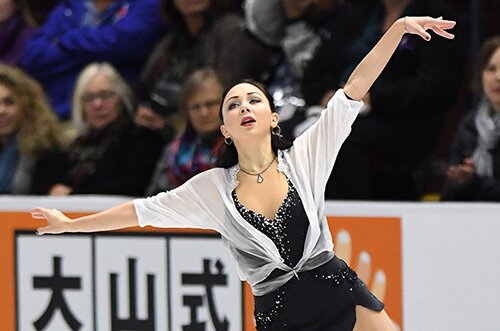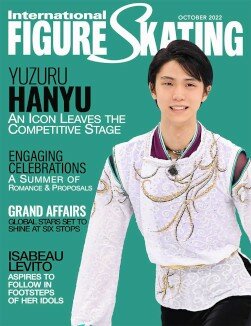

Elizaveta Tuktamysheva was at the top of the figure skating world when she won the 2015 European and World titles. But after that triumphant season she lost her rhythm and since then has failed to make the Russian teams for either Championships, despite producing solid results at Grand Prix and Challenger Series events.
Injuries and inconsistency have haunted Tuktamysheva the past two seasons, but it has also been a mental game. She suffered from back pain at the end of last season, was off the ice for two weeks, and was not allowed to practice jumps for another two weeks. “Everyone knows that figure skaters have back and knee problems and injuries. So far everything is OK and the most important thing is to keep it that way. Let’s hope it will last through this season and maybe beyond,” she said with a laugh, adding that her back is improving.
After analyzing what happened last season Tuktamysheva said she is moving forward. “It was not the most successful season in my career. I could have done better and had better results. At the end of the season we drew some conclusions because there were great performances and terrible performances. Some things were better, so there was progress. “I drew most of the conclusions myself about what I need to work harder on and what I need to focus on and I had the summer to prepare.”
Her preparations for the Olympic season got underway in May when Tuktamysheva and her St. Petersburg training group went with coaches Alexei Mishin and Tatiana Prokofieva to their annual off-season camp in Tartu, Estonia.
Tuktamysheva then took a two-week vacation — most of which was spent in Thailand — before heading to Courchevel, France, in June for another training camp. During that time, Tuktamysheva, her coaching team and choreographer Adam Solya — a Hungarian-born professional dancer who lives in Belgium — selected the music for her programs this season.
“Adam is a new guy, a fresh breeze in our group. We like to invite new experts every year to have different styles. I just started working with him, but I like it a lot and, so far, it is going very well,” Tuktamysheva explained. “For the free, we chose a Tango. I really like the idea and if everything works out as we plan it should be really good. We’re using several pieces of music and they could go in different directions. But for now we just have one piece.”
Tuktamysheva competed at two pre-season competitions to prepare for her Grand Prix events and Russian nationals, which will play a decisive role in the selection of the 2018 Russian Olympic team. She placed sixth at Lombardia Trophy and third at Finlandia Trophy. “I think it is always good for skaters to compete their programs many times. It is a plus when you perform in front of spectators and judges to prepare for the Grand Prixs,” said the 20-year-old, who has been assigned to Cup of China and Internationaux de France.
Tuktamysheva knows that qualifying for the 2018 European, Olympic Winter Games and Worlds teams will be tough. Russia has three spots at each event, but there are many strong contenders and the field is deep. “The competition (in Russia) is huge, and the most important thing obviously is consistency and the exact execution of the elements,” Tuktamysheva acknowledged. “The programs need to be rich and packed. We’ll focus on the components so I won’t have such problems that I had before — there were jumps and elements but the second mark was suffering.
“We’ll work on it to impress the judges with beauty. Obviously, I can’t forget about the triple Axel that I have to return and show.”
Her boyfriend, Russian singles skater Andrei Lazukin, who also trains under Mishin and finished fourth at 2017 Russian nationals, said, “her triple Axel is better than mine.”
Tuktamysheva said she lost her confidence following her 2015 global victory, and felt the pressure of being the World champion. “The significance of all competitions I did was higher after I won the World title. Now, I analyze each competition — what was right and what wasn’t right. I find answers to all the questions, and realize what I need to do. It is difficult to always control your emotions in competition so the most important thing is I have to be calm and balanced in competitive and stressful situations.”
Gradually adding difficulty to her programs as the season progresses has proven to be the right approach for her she said. “When I had a good season, I had easier programs in the beginning and then, when I got into shape, we increased the technical difficulty. We started with a double Axel-triple toe and then a triple toe-triple toe — and then we went to the World Championships with a triple Axel — which is still a mystery to me.
“Right now, I just want to build programs that the coaches and I like and are logically constructed regarding the components. I want to work on all the elements that I have to do in the program so that there is consistency and accuracy in practice.”
Tuktamysheva hopes her boyfriend can also have a breakthrough this season. Lazukin struggled with a back injury a year ago and was not sure whether he would continue competing, but he finished last season with strong performances. “I can’t say that it was an excellent season for me — I could have done better,” he reflected. “But nevertheless, I learned many important lessons and I got a lot of competition experience that I lacked before. I also analyzed each of my competitions and took something new from each one and my confidence grew.”
Overcoming a serious injury can sometimes push a skater in the right direction, Tuktamysheva added. “When I tore three ligaments in my foot before the Olympic season (2013-2014), I didn’t skate and I thought about retiring. During that time I realized what I wanted to do and why I wanted to do it.
“After a break, you don’t go to practice like it is a labor camp. On the contrary, you enjoy it because you know this is what you want to do and you love doing it. This is is why I stayed and did not retire. When you are making the decision yourself and nobody is putting pressure on you, you realize yourself that this is your life — not just a job but something you enjoy. Then probably the results will come.
“Obviously, athletes do not want to have to deal with and overcome serious injuries and long breaks — but at least, for me, it has led to progress.”
(Originally published in the October 2017 issue of IFS)




